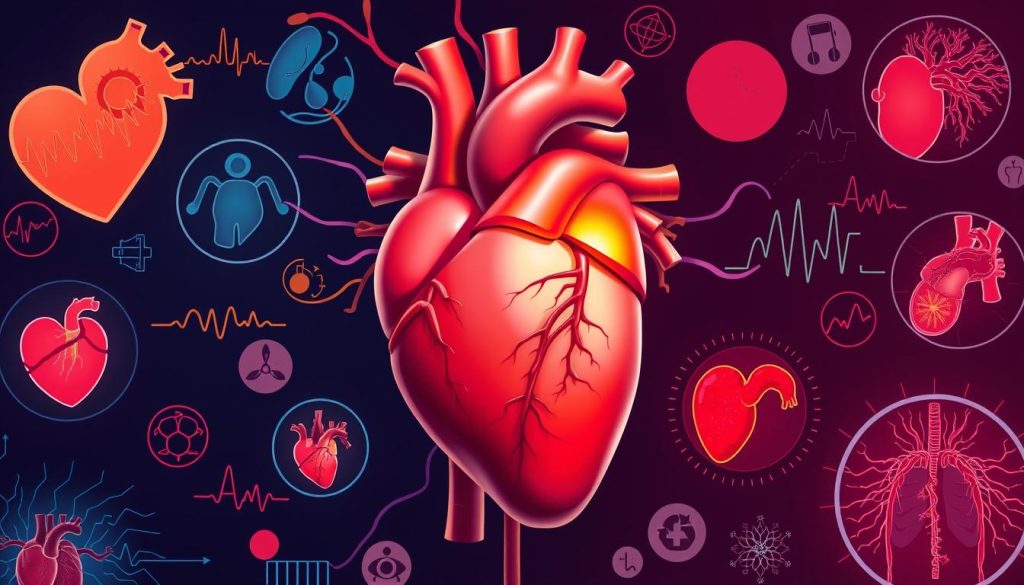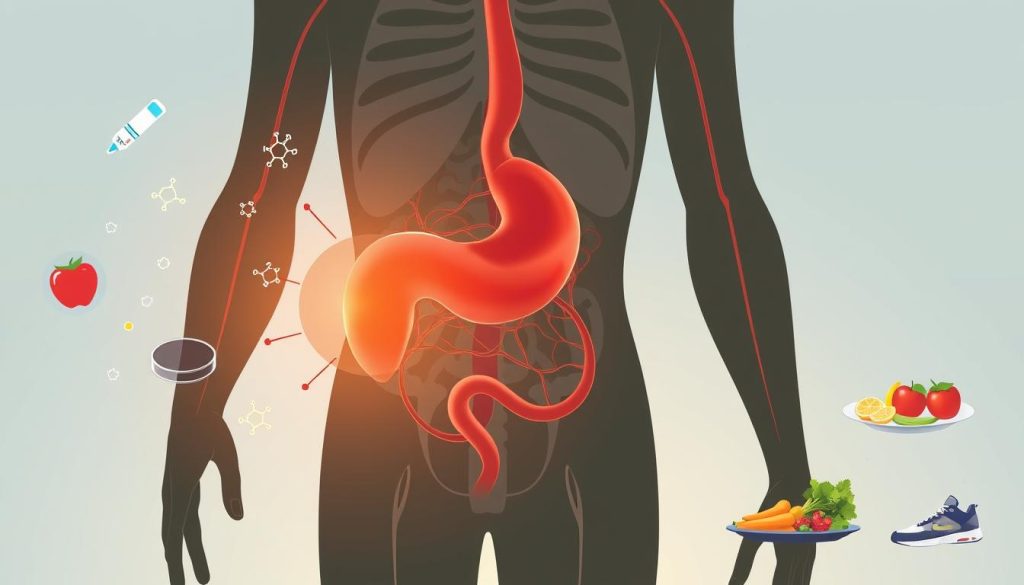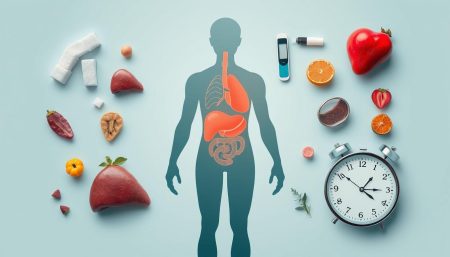Diabetes and diabetes mellitus are big health issues today. They affect millions worldwide and need a better understanding of diabetes. We aim to explore this condition deeply, focusing on how knowledge helps manage and treat it.
Diabetes mellitus is more than just high blood sugar. It affects life quality and health risks over time. Each type of diabetes, like Type 1, Type 2, or gestational, has its own challenges. Our guide aims to help and support those dealing with diabetes and its effects.
We’re not just sharing facts; we’re building a base for informed choices. These choices can make a big difference in people’s lives. Let’s start this journey of learning and support, rooted in science and real experiences.
Diabetes Overview: A Comprehensive Introduction
Diabetes is a big health problem worldwide, with type 2 diabetes being the most common. Knowing diabetes symptoms and how to manage it is key to fighting it. This guide aims to clear up what diabetes is, how common it is, and the best ways to handle it.
Diabetes cases have grown a lot in recent years. This makes it very important to have good ways to manage it. Doctors and patients are always looking for better ways to deal with diabetes symptoms.
- Knowing diabetes symptoms and catching it early
- Following the treatment plan given
- Checking blood sugar levels often
It’s also important to know the difference between Type 1 and type 2 diabetes. Both have similar symptoms and management needs, but they start in different ways. This means each person needs a treatment plan that fits their needs.
| Type 1 Diabetes | Type 2 Diabetes |
|---|---|
| Autoimmune response | Insulin resistance |
| Usually diagnosed in youth | Mostly diagnosed in adults |
| Lifelong insulin dependency | Potential for oral medications |
To fight the rise of diabetes, like type 2 diabetes, health programs focus on prevention and lifestyle changes. Good diabetes management helps reduce diabetes symptoms. It also makes life better for those with diabetes. This shows why teaching about diabetes care is so important.
Exploring the Causes and Types of Diabetes
Diabetes is a complex condition with many triggers, symptoms, and ways to manage it. Understanding the causes of diabetes and the differences between its types is key. We need to look at genetics, lifestyle, and environment to get it right.
Key Factors Leading to Diabetes Mellitus
Many factors lead to diabetes mellitus. Genetics are a big part, with a higher risk if your family has it. Poor diet, not exercising, and being overweight also play a big role in type 2 diabetes. Some viruses can even cause type 1 diabetes.
Variations Between Type 1 and Type 2 Diabetes
Type 1 diabetes usually starts in kids and young adults. It’s an auto-immune disease where the body attacks insulin-making cells. People with type 1 diabetes need insulin to live.
Type 2 diabetes is more about lifestyle and genetics, leading to insulin resistance. It often starts in adults over 45 but is now seen in younger people too. Changing your lifestyle can help manage type 2 diabetes.
The Role of Insulin in Blood Sugar Regulation
Insulin is key in keeping glucose levels in check in our bodies. It’s made by the pancreas and helps cells take in glucose for energy or storage. This keeps glucose levels steady.
How Insulin Manages Glucose Levels
When we eat, carbs turn into glucose that goes into our blood. The pancreas then makes insulin to move glucose into cells. Without enough insulin, glucose stays in the blood, causing high levels that can harm health.
Understanding Insulin Resistance in Type 2 Diabetes
In type 2 diabetes, cells don’t respond well to insulin, a problem called insulin resistance. This makes the pancreas work harder to keep glucose levels normal. Over time, this can wear out the pancreas and reduce insulin production.
| Condition | Impact on Insulin Production | Resulting Glucose Levels |
|---|---|---|
| Normal Function | Insulin properly regulates glucose uptake | Stable and within normal range |
| Insulin Resistance | Increased insulin production initially | Potentially higher without intervention |
| Advanced Type 2 Diabetes | Decreased insulin efficacy and production | Often elevated, difficult to control |
To fight insulin resistance, we often change our diet and exercise more. Sometimes, we also take medicine to help our bodies use insulin better and manage blood sugar regulation better.
Identifying Early Signs and Symptoms of Diabetes
It’s key to spot diabetes signs early for quick treatment. Knowing these signs helps prevent serious health issues. The symptoms can sneak up on you, so it’s important to be aware.
People at risk should watch for these signs:
- Increased thirst and frequent urination because your body has too much glucose.
- Unexplained weight loss even when you’re eating a lot.
- Fatigue when your cells don’t get enough sugar.
- Blurred vision from high blood sugar levels affecting your lenses.
- Slow-healing sores or infections.
- Areas of darkened skin in body folds and creases.
Knowing these symptoms helps catch diabetes early. If you notice any, see a doctor right away. Early detection means better health outcomes.
As shown, tracking diabetes symptoms is key to good health. Regular check-ups and blood tests help catch diabetes early. This can stop symptoms from getting worse.
In short, knowing diabetes signs is critical for quick action. With this knowledge, people can take steps to protect their health. This could save lives or greatly improve life quality for those with or at risk of diabetes.
Diabetes Mellitus and Diabetes: What’s the Difference?
In everyday talk, ‘diabetes’ and ‘diabetes mellitus’ are often mixed up. But they mean slightly different things, which is key to understanding the condition. Let’s explore the differences between these terms to get a clearer picture of their medical and historical backgrounds.
Diabetes mellitus is the official term for the metabolic disorder with high blood sugar. This condition, often just called diabetes, happens when the body can’t make enough insulin or can’t use it well.

The term diabetes comes from the Greek word ‘diabainein’, meaning ‘to pass through,’ because of the excessive urination it causes. Diabetes mellitus, with ‘mellitus’ meaning ‘honey-sweet’, points to the sugar in urine, a common sign of the disease.
To better understand their differences, here’s a table comparing them:
| Term | Definition | Key Symptom |
|---|---|---|
| Diabetes Mellitus | Formal medical diagnosis for conditions with high glucose levels. | Sugar in urine |
| Diabetes | Colloquially used to refer to diabetes mellitus. | Excessive urination |
It’s important to know the exact terms for clear communication in medical settings and learning about diabetes’s health effects. Understanding the differences helps in managing and understanding the health impacts of diabetes mellitus.
Monitoring Blood Sugar: Techniques and Tools
Managing diabetes well means keeping a close eye on blood sugar levels. Using the best methods and tools helps a lot. It’s good for your health now and in the future.
The Importance of Regular Glucose Monitoring
Checking blood sugar often can stop many diabetes problems. These include nerve damage, kidney issues, and heart disease. It helps you make better choices about what you eat, how active you are, and your medicine.
Advanced Tools for Blood Sugar Tracking
New technology has made tracking blood sugar easier and more accurate. You can choose from simple finger-prick devices to advanced continuous glucose monitors (CGMs). There’s something for everyone, no matter your lifestyle.
- Finger-prick glucometers: They’re simple and give quick results. They’re used a lot because they’re easy.
- Continuous Glucose Monitoring Systems (CGMs): These devices show your blood sugar levels in real-time. You don’t need to prick your finger often. They’re great for those who want to see their glucose levels all day.
These tools help you see your blood sugar levels every day. They also show you trends over time. This is why tracking your glucose is so important for managing diabetes.
Thanks to new technology, checking your blood sugar is easier and less painful. This helps you control your diabetes better.
Managing Diabetes: Lifestyle, Diet, and Medication
Managing diabetes is about making lifestyle changes, eating right, and taking medicine. It’s all about finding the right balance. This balance helps keep blood sugar levels in check and improves health.
Patients should aim to be active every day. Exercise helps control blood sugar, aids in weight loss, and boosts heart health. A special diabetic diet is also key. It limits sugars and carbs but is full of nutrients.
- Regular Exercise: Includes aerobics, strength training, and flexibility exercises.
- Balanced Diabetic Diet: Focuses on nutrient-rich foods, low in simple sugars and fats.
- Medication Compliance: Adhering strictly to prescribed diabetes medications or insulin therapy.
Medicine is also very important. People with diabetes might take pills or insulin shots. It’s vital to take these medicines as directed to keep blood sugar stable.
Here’s a quick look at what foods are good for diabetes management.
| Meal | Recommended Foods | Foods to Avoid |
|---|---|---|
| Breakfast | Oatmeal, Greek yogurt with berries | High sugar cereals, white bread |
| Lunch | Grilled chicken salad, quinoa | Processed meats, white pasta |
| Dinner | Grilled salmon, steamed vegetables | Fried foods, sugary desserts |
| Snacks | Nuts, fresh fruit | Candies, cakes |
By combining these strategies, people can keep their blood sugar stable. This reduces the risk of serious health problems. It also makes life better overall.
Navigating Diabetic Diet and Nutrition
Starting a journey to manage diabetes well means understanding what to eat. It’s about making meals that are good for diabetics. Choosing the right foods helps keep blood sugar levels stable and improves health.
Creating a Balanced Diabetic-Friendly Meal Plan
Creating a meal plan for diabetics doesn’t have to be hard. It’s all about eating a variety of foods that are low in sugar but full of nutrients. This mix helps control blood sugar and keeps the body nourished.
- Eat lots of fiber-rich veggies like broccoli and some fruits like berries.
- Choose whole grains over refined carbs for better blood sugar control.
- Make sure to include lean proteins and healthy fats in your meals to stay full.
Superfoods and Their Role in a Diabetic Diet
Superfoods are key in a diabetes diet. They offer powerful nutrients that help manage diabetes better.
| Superfood | Benefits |
|---|---|
| Chia Seeds | High in omega-3 fatty acids and fiber, aids in blood sugar regulation |
| Blueberries | Rich in antioxidants and low in sugar, support heart health |
| Spinach | Low in calories, high in vitamins A and C, and high in minerals |
| Nuts | Good source of healthy fats and protein, helps manage hunger |
Adding these superfoods to your diet can increase nutrient intake. It may also help control blood sugar levels. Planning meals with these ingredients can make your diet more nutritious and balanced.
Natural and Pharmaceutical Treatment Options
Looking into effective diabetes treatment means mixing pharmaceutical options with natural methods, like herbal remedies. Using both ways helps manage and maybe even improve diabetes.
Innovations in Diabetes Medication
The world of diabetes medicine has grown a lot. New ideas focus on making drugs better and creating new ones. These new drugs aim to tackle diabetes in different ways. They also try to reduce side effects that older treatments can cause.
Herbal Remedies and Their Efficacy
Herbal remedies have been around for ages in traditional medicine. They’re becoming more accepted in treating diabetes thanks to science. People like them because they have few side effects and help improve health in a natural way.
| Treatment Type | Description | Benefits |
|---|---|---|
| Metformin | A widely prescribed diabetes drug that improves glucose tolerance and lowers insulin levels. | Reduces blood sugar levels; relatively low risk of hypoglycemia. |
| Cinnamon | Common spice with possible blood sugar-lowering effects. | Antioxidant properties; easy to add to your diet. |
| SGLT2 inhibitors | New drugs that help prevent high blood sugar by aiding the kidneys in removing glucose through urine. | Good for heart health; can help with weight loss. |
| Ginseng | Herb that can improve pancreatic cell function and insulin secretion. | Increases energy; improves insulin sensitivity. |
Long-Term Risks and Complications of Diabetes
Diabetes can lead to serious health problems if not managed well. This section looks at major issues like diabetic neuropathy and heart problems. These are big concerns for people with diabetes.
Understanding Diabetic Neuropathy
Diabetic neuropathy is a common problem for people with diabetes. It happens when high blood sugar damages nerves, often in the legs and feet. Symptoms include tingling, numbness, and pain.
It’s important to catch this early and manage it well. Keeping blood sugar in check, eating right, and taking medicine as directed are key steps.
Cardiovascular Complications in Diabetic Patients
Heart problems are a big worry for those with diabetes. These include heart disease, stroke, and poor blood flow in the legs. High blood sugar can clog blood vessels.
To lower these risks, it’s important to control blood sugar, blood pressure, and cholesterol. Making healthy lifestyle choices and taking medicine as prescribed can help.

| Complication | Symptoms | Preventive Measures |
|---|---|---|
| Diabetic Neuropathy | Tingling, numbness, pain, weakness | Glucose management, proper diet |
| Cardiovascular Diseases | Reduced blood flow, chest pain | Blood pressure and cholesterol control |
Managing diabetic complications needs a detailed plan. Regular health checks and proactive health habits can lower risks of diabetic neuropathy and cardiovascular complications. Learning about these issues and staying vigilant are essential to prevent them from getting worse.
Preventative Measures to Avoid Diabetes Onset
To fight off diabetes prevention and lower its risk, making lifestyle changes is key. Simple steps like eating right and staying active can help a lot. Here are some easy ways to live healthier and avoid diabetes.
- Eat a balanced diet with less sugar and more fiber to keep blood sugar stable.
- Do at least 30 minutes of moderate exercise, like brisk walking or cycling, most days.
- Don’t smoke, as it can make insulin resistance worse and raise diabetes risk.
- Keep a healthy weight, aiming for a BMI in the normal range, to avoid diabetes.
- Get regular screenings and blood tests to catch prediabetes early, when changes can make a big difference.
Knowing your family’s health history and seeing your doctor regularly also helps a lot. Here’s a quick table showing how lifestyle choices affect diabetes risk:
| Lifestyle Factor | Impact on Diabetes Risk |
|---|---|
| High Fiber Intake | Low |
| Regular Exercise | Low |
| Smoking | High |
| Optimal BMI | Low |
| Regular Health Screenings | Low |
By taking these steps, you can greatly lower your diabetes risk. This not only improves your life but also helps the healthcare system. Sticking to these changes makes diabetes prevention easier and more effective.
Technological Advancements in Diabetes Care
New technology has changed how we manage diabetes. It includes better glucose monitoring and telemedicine. These tools help patients take more control of their health and make healthcare more efficient.
The Future of Glucose Monitoring Devices
Glucose monitoring has improved a lot thanks to new tech. Continuous Glucose Monitors (CGMs) are a big step forward. They give patients real-time info on their blood sugar levels without needing to prick their skin.
How Telemedicine is Changing Diabetes Management
Telemedicine is key in diabetes care. It makes it easier for patients to stay in touch with their doctors. This is great when it’s hard to see a doctor in person.
Telemedicine is not just easy. It also helps keep diabetes under control. It’s a big help for people living far from doctors or in areas with limited access to healthcare. It lets patients and doctors talk and make changes to treatment plans quickly.
| Feature | Benefit |
|---|---|
| Real-time glucose monitoring | Prevents glucose level extremes and facilitates immediate response |
| Remote patient monitoring | Telemedicine ensures continued care from the comfort of the patient’s home |
| Data sharing capabilities | Enables timely feedback and personalized treatment adjustments from healthcare providers |
Psychological Impact of Chronic Illness and Diabetes
Living with a chronic condition like diabetes affects more than just the body. It also has a big psychological impact. People with diabetes face special challenges that affect their diabetes mental health. It’s important to recognize these challenges to manage them well.
Diabetes can cause anxiety, depression, and emotional stress. These feelings can make it hard to manage the condition. Understanding the psychological impact is key in treating and managing diabetes.
Coping Strategies for Mental Health
Coping strategies are vital for those dealing with diabetes’s mental stress. Mindfulness meditation, regular exercise, and hobbies can reduce stress and improve mental health. Also, eating well and sticking to medication can help manage mood swings and symptoms of anxiety and depression.
Support Systems and Communities for Diabetics
A strong support system is essential for those with diabetes. This includes family, friends, healthcare professionals, and community support groups. These groups offer emotional support and practical advice, helping individuals manage their condition better and deal with diabetes mental health issues.
Being part of communities, online or in-person, can greatly reduce feelings of isolation. Sharing experiences and solutions helps develop effective coping strategies. It also builds a community that understands the challenges of living with a chronic condition.
Success Stories: Life Beyond Diagnosis
Looking at diabetes success stories can really lift your spirits. These tales show people thriving with diabetes. They share tips and lifestyle changes that work well. Let’s look at some examples of how managing diabetes can lead to a happy life.
Everyone’s journey with diabetes is different. But, shared experiences offer valuable insights and motivation. Here are key points that help people succeed with living with diabetes.
- Maintaining a balanced diet specialized for diabetic needs.
- Regular physical activity tailored to personal abilities and health status.
- Consistent monitoring and management of blood glucose levels.
- Effective use of medications and insulin therapies prescribed by healthcare professionals.
- Regular consultations and follow-ups with healthcare providers.
To better understand, here’s a detailed table. It shows people who turned their diagnosis into success stories. They did it through good management and a positive attitude.
| Strategy | Implementation | Outcome |
|---|---|---|
| Balanced Diet | Adopted a meal plan rich in whole grains, fruits, and vegetables. | Significant improvement in glycemic control. |
| Physical Activity | Incorporated 30 minutes of moderate exercise into daily routine. | Enhanced cardiovascular health and reduced HbA1c levels. |
| Regular Monitoring | Used a continuous glucose monitoring device. | Kept blood sugar levels within target range more consistently. |
| Medical Consultation | Engaged in bi-monthly endocrinologist visits. | Personalized treatment adjustments and increased support. |
These diabetes success stories show that living with diabetes is possible. With the right support and effort, it can be managed. Each story is a reminder that diabetes doesn’t limit one’s life.
Emerging Research and Future Prospects in Diabetes Treatment
The world of diabetes care is changing fast. New research is bringing hope to those with the condition. Scientists are working hard to find ways to grow new insulin-making cells in the pancreas. This could be a big step forward for Type 1 diabetes.
Another exciting area is using immunotherapy to fight Type 1 diabetes. Researchers at places like the Joslin Diabetes Center are trying to stop the immune system from attacking these cells. They hope this could slow down or even stop diabetes from getting worse.
For Type 2 diabetes, scientists are focusing on precision medicine. They want to create treatments that fit each person’s unique needs. This could make treatments more effective and improve people’s lives.
Artificial intelligence is also playing a big role in diabetes research. AI can look at lots of data to find new ways to help patients. The goal is to make life better for people with diabetes and maybe even find a cure.
FAQ
Q: What is diabetes mellitus?
A: Diabetes mellitus is a long-term health issue. It happens when your body can’t make or use insulin right. This leads to high blood sugar levels.
Q: How common is diabetes, and who is most affected?
A: Diabetes affects millions worldwide. It doesn’t just hit one age group or background. But, some groups might be more likely to get it.
Q: What are the main causes of diabetes?
A: Diabetes can come from genes, environment, and lifestyle. Poor diet and not exercising enough can also play a part. Type 2 diabetes often involves insulin resistance.
Q: How does insulin regulate blood sugar?
A: Insulin is a hormone from the pancreas. It helps cells use glucose for energy. This keeps blood sugar levels normal.
Q: What are the early signs and symptoms of diabetes?
A: Early signs include needing to pee a lot, being very thirsty, and feeling tired. You might also see blurred vision, slow-healing wounds, and numbness in hands or feet.
Q: Is there a difference between diabetes and diabetes mellitus?
A: No, there’s no difference. “Diabetes mellitus” is the full medical term. It’s often just called “diabetes.”
Q: What is the importance of monitoring blood sugar levels?
A: Checking blood sugar regularly is key for managing diabetes. It helps adjust diet, exercise, and meds to keep glucose levels right.
Q: What lifestyle changes are suggested for managing diabetes?
A: Eating well, staying active, keeping a healthy weight, and following medication plans are good changes. They help manage diabetes.
Q: How should a diabetic-friendly meal plan look?
A: A good meal plan is full of nutrients but low in fat and calories. It should have whole grains, lean proteins, and lots of fruits and veggies.
Q: What are the treatment options for diabetes?
A: Treatments include lifestyle changes, pills, insulin shots, and other injectables. The right treatment depends on the diabetes type and how severe it is.
Q: What complications can arise from diabetes?
A: Diabetes can lead to heart disease, nerve damage, kidney damage, and eye problems. These are long-term complications.
Q: Can diabetes be prevented?
A: Type 2 diabetes can often be prevented or delayed. Healthy eating, regular exercise, and losing weight can help.
Q: How has technology improved diabetes care?
A: New tech like continuous glucose monitors, insulin pumps, and telemedicine have made managing diabetes better.
Q: What is the impact of diabetes on mental health?
A: Diabetes can affect mental health, causing anxiety, depression, and diabetes distress. But, there are ways to cope and get help.
Q: Are there any success stories of people living with diabetes?
A: Yes, many people manage their diabetes well. They do it through lifestyle changes, meds, and regular checks. This lets them live active, full lives.
Q: What does the future hold for diabetes treatment?
A: Research is ongoing for new diabetes treatments. We might see new meds, better monitoring tools, and maybe even a cure.


















